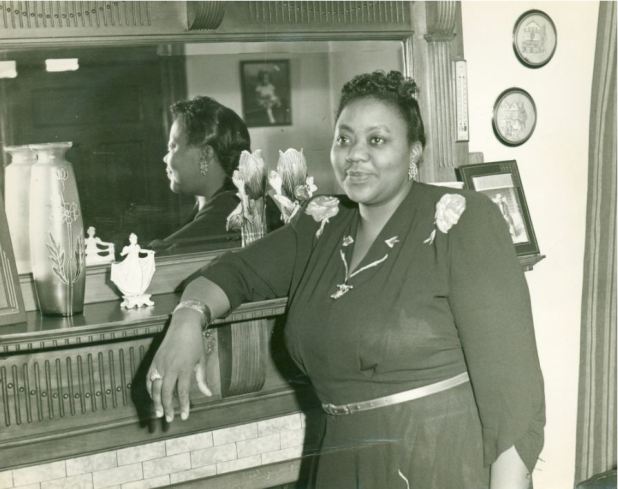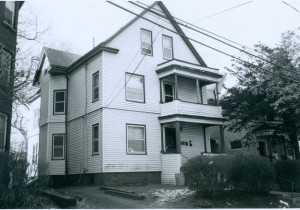The Marietta Canty House in Hartford, Connecticut, is primarily significant for its association with actress Marietta Canty (1905-1986), who received critical acclaim for her performances in theater, radio, motion pictures, and television as well as for her political and social activities. Often her roles were limited to portraying domestic servant, but by performing them with dignity, Canty, like other black actors and actresses of her day, maintained a presence for minority performers in the entertainment industry. This assisted in paving the way for future artists of diverse backgrounds to succeed in radio, stage, and film. Canty’s political and social activism in the years following her retirement from the entertainment industry (1960s through 1980s) further increased her status as a pioneer in advancing opportunities for women and minorities.
From Hartford’s Gilpen Players to Broadway and the Silver Screen
Marietta Canty was born September 30, 1905, one of five children of Henry and Mary Canty. Excelling in singing and speech at Northeast Elementary School and Hartford Public High School, Canty was pushed into acting at 18 for the Gilpen Players in Hartford, a group of African Americans interested in theater. Later, she found herself on Broadway, while attending the Lincoln Hospital School of Nursing in New York City. From there, she managed to make her first screen appearance: a walk-on role in the 1933 film version of the Emperor Jones. Her later theater roles included Correspondent Unknown (1936), The Night of January 16th (1940), and No Time for Comedy (1941). Canty appeared in more than 40 films, including The Lady is Willing, The Spoilers, The Bad and the Beautiful, Lady in the Dark, Words and Music, Father of the Bride, Sea of Grass, and Rebel Without a Cause.
Canty’s Many Achievements as a Civic Leader
Ending her acting career at 51, Canty took a job with Terry Steam Turbine Corporation in Hartford as a nurse, a position that she held until her retirement in 1971. From 1966 to 1973 she served as a justice of the peace. During her post-acting years, Canty participated in numerous organizations, served on various boards, and received many awards. Her resume included: conference director for the New England Annual Conference of the African Methodist Episcopal Zion Church, 1956-1980; president of Local Home Mission of AME Church, 1960-1980; member of first Board of Directors for the Hartford Urban League; president of the Hartford Council of the National Council of Negro Women; and regional director for the National Conference of Women. She also served as a co-chair of the Negro College Fund Campaign, 1961-1967; a member of the Charter Revision Commission of the City of Hartford, 1961; a member of the Republican Town Committee; and a member of the Board of the Hartford Chapter of the Young Women’s Christian Association. Canty received numerous awards and honors in her later years including: the Women of Year Award by Araat
Chapter, B’nai B’rith, for outstanding civic service, 1960; the Hartford Neighborhood Centers Certificate of Appreciation, 1965; the Humanitarian Award, Hartford Section of the National Council of Women, 1969; the Council Achievement Award, National Council of Negro Women, Long Island Section, 1972; and the certificate of Service and Award Recognition, American Red Cross. In 1961 and 1963 Canty ran for office on the Hartford City Council as a Republican. Her platform included more efficient daycare centers, more street lights on North Main Street in the predominately minority neighborhood, and new bus routes. She was unsuccessful in both campaigns. Marietta Canty died in her Wahl Avenue home on July 9, 1986, at the age of 80. She is buried at Northwood Cemetery in Wilson, Connecticut.
Built circa 1897, the Marietta Canty House is a two-and-one-half-story, vernacular Queen Anne residence built by developer Frederick Mahl, who constructed a street of Queen Anne-style, two-family houses between 1893 and 1898. In 1930 the house was purchased by Marietta’s parents, Mary and Henry Canty. Henry Canty was a prominent member of Hartford’s African American community, a devout Christian attending Metropolitan African Methodist Episcopal Zion Church, and an active canvasser for Republican politics.
© National Register of Historic Places and National Park Service. All rights reserved. This article originally appeared on the National Register of Historic Places Women’s History Month page.









